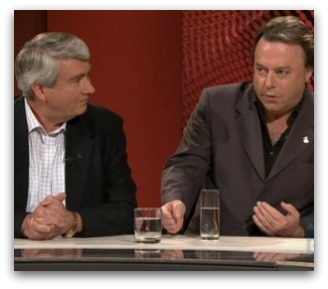Keywords: The Sydney Institute
-

RELIGION
- Frank Brennan
- 18 July 2011
5 Comments
When I appeared on Q&A with Christopher Hitchens, a young man asked whether we can 'ever hope to live in a truly secular society' while the religious continue to 'affect political discourse and decision making' on euthanasia, same-sex unions and abortion. Hitchens was simpaticao. I was dumbstruck.
READ MORE
-

EUREKA STREET TV
- Peter Kirkwood
- 15 July 2011
Austrian lay Catholic theologian, Wolfgang Palaver, is today one of the world's leading exponents of French-born philosopher Rene Girard's philosophy about the relationship between religion and violence. But Palaver had unlikely beginnings for his work as a professional Catholic theologian.
READ MORE 
-

ENVIRONMENT
Our lives will change forever as we face the creative challenge posed by the carbon tax. We will pay the real cost of producing food, and cheap and frequent overseas trips will slow. But we must not let a grasping spirit hold us from imagining an economy and lifestyle that can thrive on alternative energy.
READ MORE 
-

INFORMATION
- Frank Brennan
- 02 June 2011
1 Comment
I will happily commend Labor and the Greens should they follow Keating's challenge to further improve the native title package passed by the Howard Government. I don't claim any divine guidance for this. It's called politics.
READ MORE
-

AUSTRALIA
- Lin Hatfield Dodds
- 18 April 2011
6 Comments
Prime Minister Gillard's speech to the Sydney Institute last week, and Tony Abbot’s policy announcements two weeks ago, drew unanimous response from the community sector — that getting people into work is a sound objective, but it's harder than it looks.
READ MORE 
-

RELIGION
- Frank Brennan
- 06 April 2011
7 Comments
We need clever strategic and moral thinkers among our health professionals, who can engage with the demands of an aging population, with the gap in life-expectancy between Aboriginal and non-Aboriginal Australians, and with the increasingly politically correct debate about euthanasia.
READ MORE
-

EUREKA STREET TV
- Peter Kirkwood
- 25 March 2011
1 Comment
Earlier this year Frank Brennan celebrated the 25th anniversary of his ordination as a Jesuit priest. Former Prime Minister Paul Keating once dubbed him a 'meddling priest', a label he accepts with mixed feelings.
READ MORE 
-

AUSTRALIA
Many Japanese don't trust officials connected to the nuclear power industry because previous radiation leaks were denied or downplayed. It is difficult for those caught in the current disaster to know how to interpret statements from officials using phrases such as 'acceptable levels of radiation' and 'no immediate threat'.
READ MORE 
-

RELIGION
- Frank Brennan
- 09 March 2011
53 Comments
There are homosexual persons who enter into loving, faithful and committed relationships. It is difficult to characterise a law that gives non-discriminatory protection to such couples as 'so harmful to the common good as to be gravely immoral' as Benedict has previously done.
READ MORE 
-

AUSTRALIA
- Michael Mullins
- 21 February 2011
24 Comments
Immigration Minister Chris Bowen's speech on multiculturalism could be seen as laying the ground for a formal apology for the White Australia Policy. The parallels with the 2008 Apology to the Stolen Generations and the 2009 Apology to the Forgotten Australians are striking.
READ MORE 
-

EUREKA STREET TV
- Peter Kirkwood
- 10 February 2011
3 Comments
READ MORE 
-

EUREKA STREET TV
- Peter Kirkwood
- 10 February 2011
Lay Catholic theologian Neil Ormerod's approach was strongly coloured in the early 1990s when he and his wife Thea became activists on behalf of survivors of clergy sexual abuse.
READ MORE 